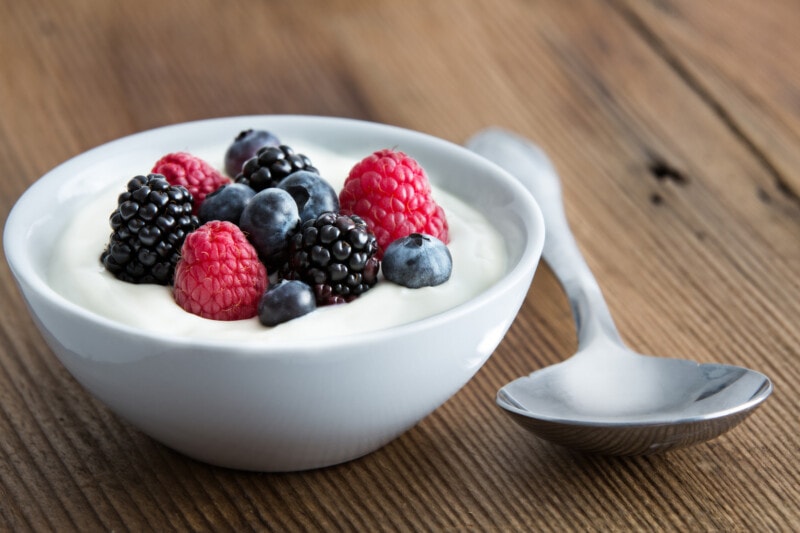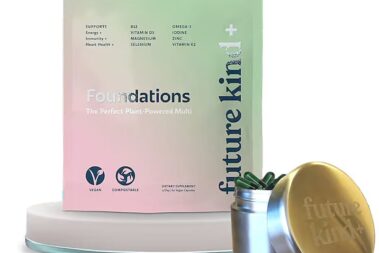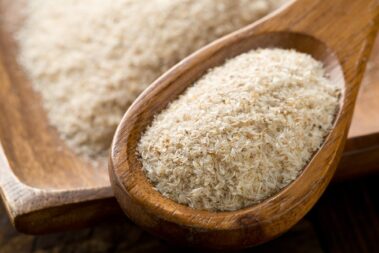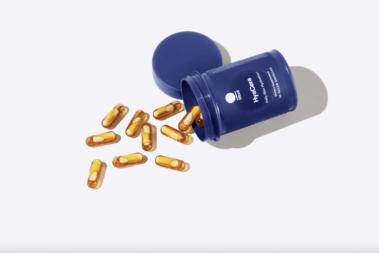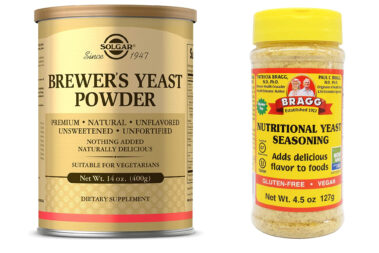Everyone knows that one of the reasons yogurt is so good for you is because it contains probiotics. But does vegan yogurt have probiotics? And if so, do those probiotics provide the same health benefits as what’s found in dairy yogurt forms?
We’ll answer those questions as well as all your other probiotic-centric vegan inquiries in this article.
Table of Contents
Does Dairy-Free Yogurt Still Have Probiotics?
Yes, vegan-friendly yogurt and lactose-free yogurt contains just as many healthy, gut biome-supporting probiotics as natural dairy yogurt. This is true whether you’re talking about cashew yogurt, almond milk yogurt, oat milk, coconut, and even hemp milk yogurt.
That’s because what makes yogurt ‘yogurt’ is the interaction of bacteria and sugar.
In the case of traditional natural yogurt, these little bacteria feed on lactose—the type of sugar found in dairy milk. In a plant-based alternative, the bacteria cultures still feed on sugar, but the form of that sugar depends on the type of milk used and other added ingredients.
For instance, oat milk contains mostly maltose while coconut milk is mostly sucrose. Nut milks have a variety of sugars but none in high amounts. Many vegan yogurts rely on added sugars to help kickstart the fermentation process.
It is the action of the bacteria cultures that turn milk—whether cow, goat, cashew, or otherwise—into yogurt.
How Probiotics Make Yogurt
The two most commonly used bacteria cultures in dairy natural yogurt are Lactobacillus bulgaricus and Streptococcus thermophilus. Other cultures may be added to achieve a desired flavor or consistency.
Both of these strains also have some capacity to ferment other sugars, such as sucrose, fructose, and maltose. Often though, non-dairy yogurt companies rely on specially chosen cultures that can produce high lactic acid yields in lactose-free environments.
Whether the bacteria are feeding on lactose, sucrose, or another sugar, the result is the same: the milk product is acidified through fermentation. This is what gives every batch of yogurt its tangy flavor and what helps it last longer than raw animal milk or plant milk.
What Are Probiotics?
The bacteria used in yogurt fermentation remains alive and active even after the process is stopped by cooling the product. These bacteria are consumed along with the yogurt and will establish in the human gut.
Because this colonization supports the health of the body, these bacteria are considered friendly bacteria, or “probiotics.”
All fermented foods contain probiotics at some point in their production. Consumables such as beer, wine, and bread don’t have any living probiotics by the time they reach your mouth, however. This is due to either over-acidification or end-stage heat treatment that ultimately kills all the bacteria.
Foods like yogurt retain living active probiotics in the final product. These probiotics contribute to your natural gut biome and help support the immune system, crowd out bad bacteria in the body, and may even actively fight against disease and disease-causing pathogens.
How Non-Dairy Vegan Yogurt Compares to Dairy Yogurt
Dairy-based yogurts typically contain at least Lactobacillus bulgaricus and Streptococcus thermophilus active cultures. These two bacteria have been widely studied and celebrated for their ability to colonize the human gut.
But, they are far from the only beneficial probiotics out there.
In fact, if you do a search for the most beneficial probiotic strains you’ll find plenty of research-backed lists that don’t even include the two types mentioned above.
Some of the most well-known beneficial bacteria strains used in the bacterial fermentation process or available as supplements, include:
- B. Bifidum
- L. Rhamnosus
- B. Lactis
- L. Casei
Many of these more-celebrated strains can be found in the best non-dairy yogurts alongside L. bulgaricus and S. thermophilus. And, because it takes many different bacteria to ferment the multitude of sugar types found in almond milk yogurt and other vegan yogurt forms, many of these alternatives provide a better variety of probiotics than dairy products.
Additionally, lactose, saturated fat, and casein—which are all found in dairy—are known to cause inflammation in the gut(1)(2). When these substances are consumed alongside probiotics, the inflammatory response they cause has the potential to reduce the incidence of colonization by those probiotics(3).
All this is to say that the probiotics found in vegan yogurts are likely to be just as effective, if not more so, than traditional dairy yogurt probiotics in colonizing the gut and benefiting the body.
Health Benefits of Probiotics
In terms of the benefits of dairy-free probiotics, the list continues to grow by the day.
Probiotics establish in the gut and help balance and maintain a healthy gut biome. A healthy gut biome is key to a properly functioning immune system. But the noticeable benefits of probiotics don’t stop there. Recent research has also connected gut health with brain function, cancer rates, and heart health.
According to Harvard researchers, probiotics can benefit the body in many ways, including:
- Reducing digestive upset, diarrhea, and other digestive disorders
- Reducing symptoms of IBS and Crhone’s disease
- Restricting the growth of H. pylori and other bad bacteria
- Reducing vaginal infections and yeast overgrowth
- Reducing urinary tract infections
- Reducing the recurrence of bladder cancer
- Preventing digestive infections
- Reducing the occurrence of skin conditions like eczema
There is also a great deal of evidence that probiotics can help with weight gain, support healthy blood pressure, and reduce oral bacteria infections.
Other Vegan Probiotic Foods
Lactose-free yogurt isn’t the only way to add probiotics into your plant-based diet. Many other fermented foods are made with plant-based ingredients or available in vegan-friendly forms.
Some of our favorite alternative sources of probiotics include:
- Kombucha – This probiotic tea is loaded with active cultures and antioxidants and can be found in various flavors to fit every taste.
- Sauerkraut – This German favorite is made by fermenting cabbage. It makes a great topper for sandwiches and veggie burgers.
- Miso – This fermented Japanese seasoning is used in a variety of dishes from soups to stir-fries. But keep in mind that exposing it to high heat will kill the active cultures.
- Kimchi – Kimchi is similar to sauerkraut but with an infusion of Korean spices.
Vegan Probiotic Supplements
If eating yogurt or one of the fermented foods listed above every day is a stretch for you, you may consider adding a quality probiotic supplement to your routine.
These sources of probiotics provide multiple bacteria strains at high concentrations to help build and maintain your gut biome. The probiotics in them are alive but not active and have a long shelf life. Once they hit the intestines, quality probiotics will become active.
Some strains will colonize the gut and continue providing benefits beyond the days you take the supplement. Others are not capable of colonizing the human gut but will provide benefits as long as they are active in your system.
Here’s one of our favorite vegan probiotic supplements. It’s potent formula has 30 billion colony-forming units made up of ten different probiotic strains, including L. Rhamnosus, L. Casei, and B. Subtillis. And, the capsules are free from animal derivatives, gluten, GMOs, and soy.
As always, we recommend checking with your healthcare provider before taking any new supplement. This is especially important if you’re taking prescription medication, pregnant or breastfeeding, or have a pre-existing medical condition.
Vegan-Friendly Yogurt: A Gut Healthy Choice
As you can see, plant-based commercial yogurts not only have probiotics in them, but they are an excellent choice for helping maintain a balanced gut biome. Because these foods are free from inflammatory dairy ingredients and packed with multiple probiotic strains, they make a great healthy snack or meal additive for those following a traditional or plant-based diet.

